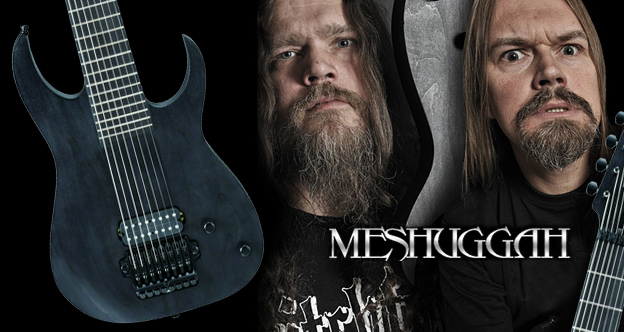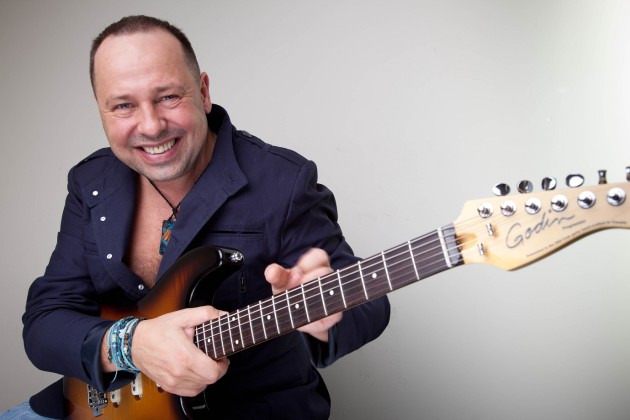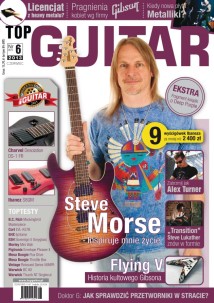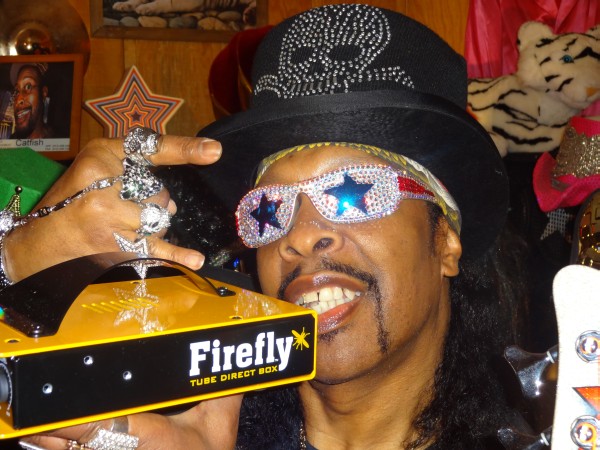Marten Hagstrom & Fredrik Thordendal of Meshuggah about their Ibanez guitars
Guitarists Marten Hagstrom and Fredrik Thordendal of the Swedish metal band Meshuggah told TopGuitar magazine about their Ibanez guitars – the new signature models as well as older ones…

TopGuitar: There are new M8M and M80M models available from Ibanez which are based on your custom made instruments. Please tell us more about your cooperation with the company…
Mårten Hagström: We started working with Ibanez way back. They endorsed us when we were still using only seven-strings. Our relationship was really good, but back then we really didn’t know how to utilize it, so we just ordered basic stuff and had some fretboard inlays or whatever, we messed around a little bit with scale and that was basically it. Then we hooked up with Fredrik Törnkvist who has this Nevborn Guitars brand. We had had this idea that maybe we would record some stuff where we were three bass players, with both me and Fredrik [Thordendal] playing bass along with Gustaf [Hielm], because we really enjoyed that tone. Then Fredrik of Nevborn said „why don’t you mix it up into an eight-string, so you would have that range and still have a guitar to do your regular stuff”. We felt that it is a cool idea so we went with the eight-string. At that point Ibanez approached us saying “we want to keep endorsing you guys and we actually think we can make you a really awesome eight-string guitar, if you just give us a chance and tell us the details and specs of what you need”. We said “OK”. Ibanez is a progressive company, the know what they’re doing, they are a major player and we had a good relationship already, so that made sense. We did it and since then it’s been no looking back. Then we tweaked it for a bunch of versions.
Did Ibanez present their design to you or was it your wishlist realized by them?
Mårten: We specified out the design and they made it the way we wanted it, and then we had to tweak it a little bit… We used those for a couple of years before we actually asked Ibanez to make it available as a production model. A lot of people started to approach us saying “Where can I buy this guitar?”. We said that people were asking about our guitars and Ibanez said “OK, we actually think it might be worthwhile making a signature series”. Then we started talking about that. We wanted to make our signature series EXACTLY the same as we have our guitars. With the setup that they have, there was no way doing that other than by hand, so they are hand made, they’re like custom guitars Made in Japan. And that’s why they’re so f****n’ expensive… And so f****n’ good as well. But then we realized – or it was actually Ibanez that realized – that there was a whole range of people that would like to try this type of guitar out but maybe don’t have the money. I couldn’t afford it if I didn’t get it for free [laughs]! So we thought that it’d make sense to make it available in a lower price version. To be honest, both me and Fredrik, we were really not expecting that good of a result that it turned out to be, because the M80M model is a lot of bang for the buck. So Ibanez did a great job!
Fredrik, you once said in an interview that the Ibanez Universe was the worst guitar for you to play, but still you had to, because there was no other decent 7-string on the market back then…
Fredrik Thordendal: [laughs] Yeah, the thing was that it had this tremolo thing that just sucked. It’s really hard to keep in tune and to balance it, and I didn’t know anything about guitars back then. So the setup was just ridiculous, it didn’t make sense – the tremolo was standing straight up. I didn’t even know that you can setup the guitar and all the stuff, just simple things! That’s why I didn’t really like that guitar, but I still have it actually and now it’s perfectly set up and it’s a really good instrument.
Marten Hagstrom & Fredrik Thordendal of Meshuggah about guitar amps
Guitarists Marten Hagstrom and Fredrik Thordendal of the Swedish metal band Meshuggah told TopGuitar magazine about their approach to guitar amplifiers vs. software simulations.
TopGuitar: At first you were using traditional guitar amps, but at some point you moved towards digital modeling to become a living proof that a band can successfully record great sounding albums using software plugins. A lot of musicians say that there is no other way to record guitars than use analog equipment, but you prove them wrong…
Fredrik: That’s pretty cool, actually!
Mårten: Yes, we’ve been saying it quite a lot. For a lot of people the form is equally important to what you’re achieving. What I mean by that is that it is very important to have that Marshall stack and that Gibson, ’cause that’s the way things should sound! But for us it’s like “OK, here we have a bunch of ideas – how do we make it sound the way we want it to sound?”. Having a bunch of different tools, we chose the ones that suited us best and could give us what we wanted. We don’t care too much beyond that point. People may think that we’re just stupid and should cut the crap and go analog or whatever. We get what we want out of it, if you don’t like it, that’s fine! But this is what we wanna do and it works for us, ’cause it’s a tool for us to achieve something that might be a little bit harder to do otherwise. So then we do it and that’s the end of the debate. We’ve done a lot of unconventional things that people don’t like. “Catch 33” is the best example. People did not enjoy that, but we’re like “are you listening to us for us to prove stuff or are you listening to us for us to give you musical experience? Because that’s what we are after”.
You used Line 6, then you moved to Fractal Axe-FX and that is your current go-to setup, right?
Fredrik: Yeah, now we have the Axe-FX II actually, but we haven’t even started using it yet. It’s because we have this perfect setup with our old Axe-FX Ultra, so we use them throughout the whole tour. But the Axe-FX II is so amazing that it’s just ridiculous! It sounds better than the real thing, in my opinion. But now I am experimenting with real amps.
Not so long ago you mentioned that you were working on some Russian tube amplifier…
Fredrik: No, that’s an older thing that just went down the toilet, but now I’m working with Mike Fortin of Randall Amps. If you’re a fan of metal guitar sound, you should try out their Satan or the 667 amps. It’s the best thing that has ever happened [to metal guitar amplification].
Marten Hagstrom & Fredrik Thordendal of Meshuggah about their style
Guitarists Marten Hagstrom and Fredrik Thordendal of the Swedish metal band Meshuggah told TopGuitar magazine about their original playing and songwriting style.
TopGuitar: You guys started a double revolution in guitar playing – first, you introduced polyrhythms and odd meters in your songs on a mass-scale; second, it’s mainly because of you that seven-string and lately also eight-string guitars became so popular among metal players! How can you relate to that?
Fredrik: I don’t know… [laughs]
Mårten: It’s hard, you know? One thing you learn when you get asked stuff about your entire career and why certain things turned out the way they did, is that you really don’t know. For us it was about having fun with our shared vision of what we tried to achieve, an atmosphere or something that we wanted to make our own. But we just rolled with it, we never consciously decided on doing it this way or another. We just tried to find tools to make something that we would be excited about hearing. We tried to make a cool album that would smash. We tried to amaze ourselves, which we never can, of course. It doesn’t work that way, but that’s the goal. That together with being a bunch of guys from up north… We were never part of any real metal scene like we would have grown up in
Stockholm, London, San Francisco or New York. We came from up where the snow is, and we didn’t know anybody. This is what happened. It’s a series of fortunate events.
You mentioned that you try to amaze yourselves. You definitely try to amaze your drummer, because as far as your guitar riffs may appear challenging, it is the drum parts that are purely insane sometimes! How does Tomas Haake handle all this stuff?
Mårten: You have to ask him, but the greatest part about this is that we don’t have to care. Me and Fredrik, we can just toss him and say “Go for it, man, this is the song!” and then he’d say “F**k you!” [laughs]
Fredrik: Actually, we just hate him, and that’s why like to make it hard for him [laughs].
Mårten: To be serious, it is a little bit like that, because that’s what comes from him, not from us. I heard him saying this in an interview and he was like “you’ve got to realize that they [Mårten and Fredrik] don’t come with guitar parts and tell me to make up the drums, they come with the entire package and then I have to learn the drums”. Fredrik is a drummer, so he knows how to program stuff that is actually playable. I don’t always do that, I just do what sounds cool to me and then Tomas says “Hey, man! How do you play that? You know I have only four limbs…”. But it’s not a matter of thinking about that beforehand. If something turns out to be too hard to play or too much of a challenge, so be it! But from the creative standpoint, you start out with the idea and then you try to envision it as good as you possibly can. And of course that’s a challenge to him. But he f***s up himself as well with his own writing, because the stuff he writes is not that easy to get over either.
Fredrik: It’s not all our fault.
Mårten: No, it’s fifty-fifty. But the thing is that we never go for tricky. Maybe in our early years it was cool to say “oh, this riff is f*****g retarded!”, but it’s really all about how it sounds like and then sometimes it turns out to be pretty tricky to play in a band situation.
You said many times that there is not much thinking and counting behind your writing – that it’s just the way that music comes out of you. But it must have started some way! I mean, do you remember the moment you got this idea of writing an odd riff?
Fredrik: It was never like “before it was like this and then it just happened”. It’s just development, I guess.
Mårten: I think that maybe if you had been a bystander, making a Meshuggah documentary since we were kids, you would probably be able to point out the time we realized that we wanted to play differently, but we don’t know that. We were just doing our thing and then all of a sudden 25 years later we’re sitting here doing an interview with you in Frankfurt. We don’t know how it all came to be, that’s not the way we analyze it. But probably back in the day there were some things about the way we do stuff, that we could pick out of other stuff. We weren’t focusing on them as much, but they were present in other music and that attracted us for some reason and we started messing around with it. And then we started to figure out that this is what makes our riffs sound cool. Next thing you know is your mind starts spitting out that stuff unconsciously so that it becomes a natural process. Which is kind of the way it’s gotta be, because we can’t really sit down and calculate music. I know that many people don’t listen to us that way a lot of times, but for us it’s still about emotion, atmosphere, or groove.
Fredrik: It’s not like a thought through thing, like “now we have to play 4 beats, and then 5”. It’s just the sound that you try to catch. Like receiving a message from somewhere… I don’t know where it’s coming from.
Mårten: The f****d up thing is then you have to break it down, realize what you’re actually playing and decide on how to make it all fall into place, but that’s not the initial idea.
Meshuggah guitarists talking “Chaosphere”, “Koloss” and new album!
Guitarists Marten Hagstrom and Fredrik Thordendal of the Swedish metal band Meshuggah told TopGuitar magazine about their 1998 record “Chaosphere”, recording their latest effort “Koloss” from 2012 and writing new material for an upcoming album.
TopGuitar: Can you consider “Chaosphere” as a breakthrough record in your career, because it contained all these original elements – which were to some extent present before – fully shaping your style for the next years to come?
Fredrik: Yes, I can agree with that.
Mårten: Yeah, that’s true, because the old thrash metal roots were pretty obvious on “Contradictions [Collapse]” and “Destroy [Erase Improve]”. We were still very much a progressive thrash metal band for many intents and purposes. But on “Chaosphere”, we didn’t know what we were doing with that record. That was by far the most chaotic, stressed out, f****d up and non-creativity promoted album, it was a mess to actually realize what we were doing! I remember me and him [pointing at Fredrik] on the subway, saying “we might rethink making this album, I don’t know if this is a good idea”.
I’m glad you didn’t do this!
Mårten: I know, I mean, we’re fine with it now, but back then [we weren’t]. And maybe that’s because we took a step off the path. We felt uncertain about what we were doing, because we were going some place we hadn’t been before. A new territory is always a little bit scary. And then we learned to enjoy that even more. So you are probably very right that “Chaosphere” was some kind of pass for us.
In your „Konstrukting the Koloss” studio documentary you seemed like making a record is a pain, a road through hell – why is that?
Mårten: It is! Here’s the thing: when you start writing and you have the first couple of riffs, there’s no anxiety. That’s where we are right now. But the further you get into the process, the more you loose track… So all of a sudden you’re five guys trying to unite around these songs, and riffs, and creative process, ideas of titles and all that stuff that comes with making an album. And then we try to discuss what we like and what we want, but out of that comes great insecurity, because after a while you loose track of where you’re at. You think you know where you are, but you know that you’re fooling yourself. So the further you get into the recording, the less sure you are of what you’ve achieved. I always say that whenever we release an album, when we’re done with recording and mixing, and we are going into mastering process, I’ve never felt anything but anxiety. The last couple of days are certainly not enjoyable…
Fredrik: Yeah, exactly!
Mårten: But that’s part of your creative process. I think that’s important. If you’re playing it safe, saying that “this sounds decent”, that’s fine, but it’s not for us. So if we feel at the end of this next, coming up album process that “we got it all down”, then it’s probably gonna suck!
Was it always like this, with every record?
Mårten: Yes. To varying degrees, but yeah.
Fredrik: When you’re experimenting with stuff you’ve never heard before, it’s kind of hard to realize if it sounds good or not, if you like it or if you’re going to just leave it. We are working hard on everything and we just loose track of what we think about that.
Mårten: It’s not like we send demos down to Markus Staiger at Nuclear Blast and say “hey, do you like the melody on the new chorus we found?” [laughs]. We trust only ourselves when it comes to the judgment with whether we’re appreciative of what we’ve done or not. That means that we’re five guys in a bubble, trying to figure out what the f**k we’re doing, and what it’s gonna become. And that’s stressful regardless of if it’s your first album or your twentieth, I guess.
Fredrik: It’s the same thing with every album…
You just mentioned you are working on a follow-up to the “Koloss”. Any things you can say about the new material?
Mårten: Yes, we are now starting to write. It’s gonna be folk music straight through with a little bit of country touch, only acoustics and a lot of a capella [laughs]. No, but really, and that’s probably true for most bands, we start with a riff here, two riffs there, maybe half a song. And then it accumulates to be something that you actually have to make happen. It’s not only about coming up with the idea, you have to arrange it and make it into a song. That’s when you know where the album is starting to go. Right now, we don’t have a clue. Whatever I’m doing now may not make it to the album, because next week Fredrik might come up with something that sets the tone for it, or Jens, or Tomas, or me. So now we’re trying to get that snowball rolling and then we’ll jump in and hope that we won’t break all our legs before it stops. That’s about how it feels. But we’re not there yet, so it’s still too early tell where we’re going. It might be an ultra-fast death.thrash metal or just slow improvisation.



